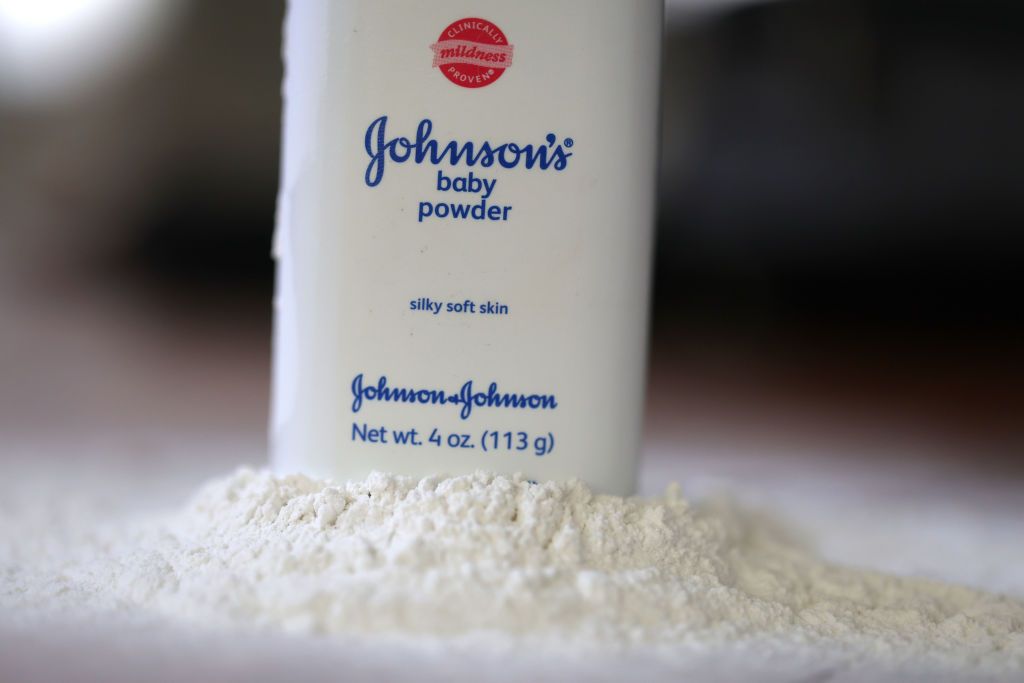
Source: Justin Sullivan / Getty
You may have a grandmother, mother or auntie who used baby powder to keep their intimate regions cool in the summer or just because it made them feel fresh year-round. Almost everyone has seen a Johnson & Johnson baby powder in the arsenal of beauty products of a woman in their lives.
It turns out that the innocuous looking powder was dangerous. Tens of thousands of plaintiffs sued the company in the past decade, alleging that the talc in baby powder is a carcinogen and that regular users were being diagnosed with ovarian cancer and mesothelioma, a cancer associated with asbestos exposure.
This week, Johnson & Johnson agreed to settle those cases for $8.9 billion.
Though it may sound like good news, lawyers for the plaintiffs think Johnson & Johnson got off too lightly.
“Even though $8.9 billion sounds like a lot of money, when you spread it out, it comes out to not very much at all for the people who suffered,” Jason Itkin told the New York Times. His law firm represents 10,000 women who say they were diagnosed with ovarian cancer due to baby powder usage.
It is alleged that the company knew there was a link between talc and asbestos since the 1970s. An extensive Times report says that despite these findings, Johnson & Johnson repeatedly tried to keep that information from the public.
Black women have been particularly affected. In 2021, the National Council of Negro Women filed a lawsuit, alleging that although Johnson & Johnson was aware of the risks of baby powder usage, instead of warning Black women, they specifically targeted them in advertising and marketing.
“This company, through its words and images, told Black women that we were offensive in our natural state and needed to use their products to stay fresh,” Janice Mathis, the executive director of the National Council of Negro Women, said in a statement.
She added, “Generations of Black women believed them and made it our daily practice to use their products in ways that put us at risk of cancer — and we taught our daughters to do the same. Shame on Johnson & Johnson.”
An internal presentation in 2006 suggested that the company start marketing powder more directly to its “high propensity” customers which included the 60% of Black women who used baby powder, compared with 30% of the rest of the population. In Chicago, a firm hired by Johnson & Johnson handed out 100,000 gift bags to locations Black women frequented. A radio campaign targeted “curvy Southern women,” the lawsuit said.
Civil rights attorney Benjamin Crump represented the NCNW.
“This lawsuit is about the lives of our grandmothers, our mothers, our wives, sisters and daughters — all of whom were cynically targeted by Johnson & Johnson,” Crump said in 2021. “All the while, company executives knew the risk of ovarian cancer from talc.”
After fighting upwards of 25,000 lawsuits, Johnson & Johnson agreed to stop selling baby powder in the U.S. and Canada in 2021. But the company said the settlements did not come with an acknowledgment of any wrongdoing.
Erik Haas, worldwide vice president of litigation for Johnson & Johnson said the allegations “lack scientific merit” but that settling allowed the company and plaintiffs to move forward.
“Resolving this matter… is both more equitable and more efficient, allows claimants to be compensated in a timely manner and enables the company to remain focused on our commitment to profoundly and positively impact health for humanity,” Haas said in a statement.
















